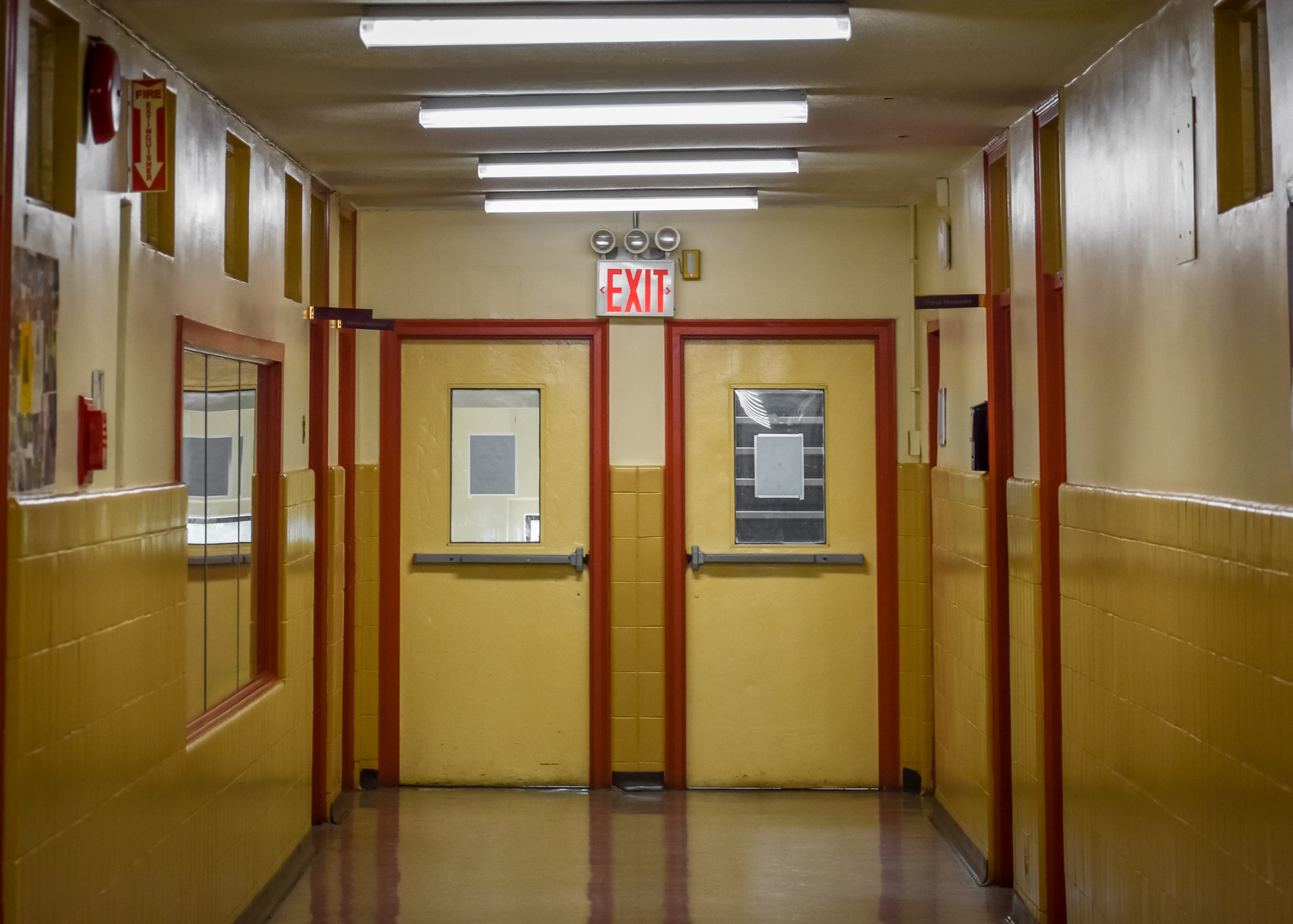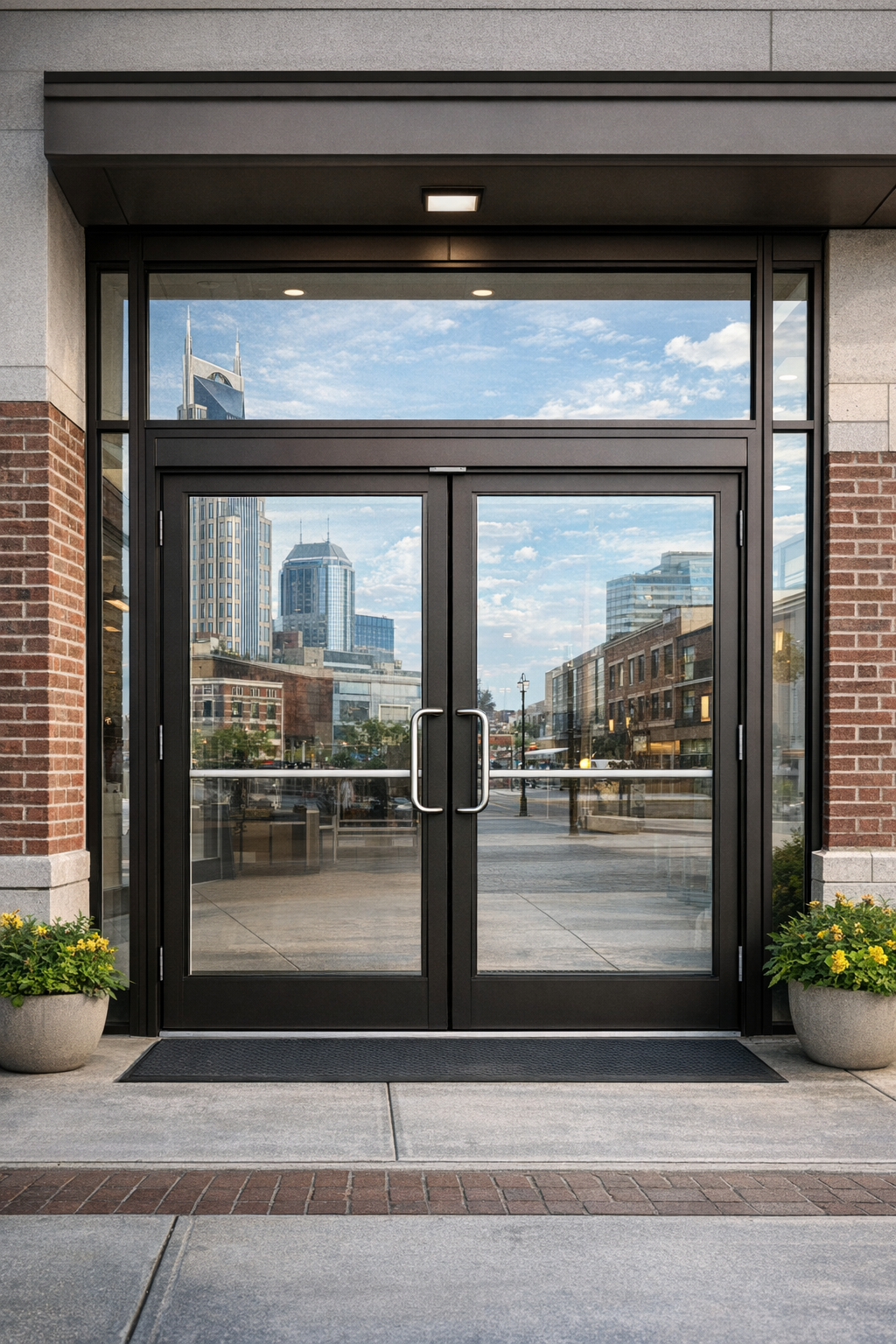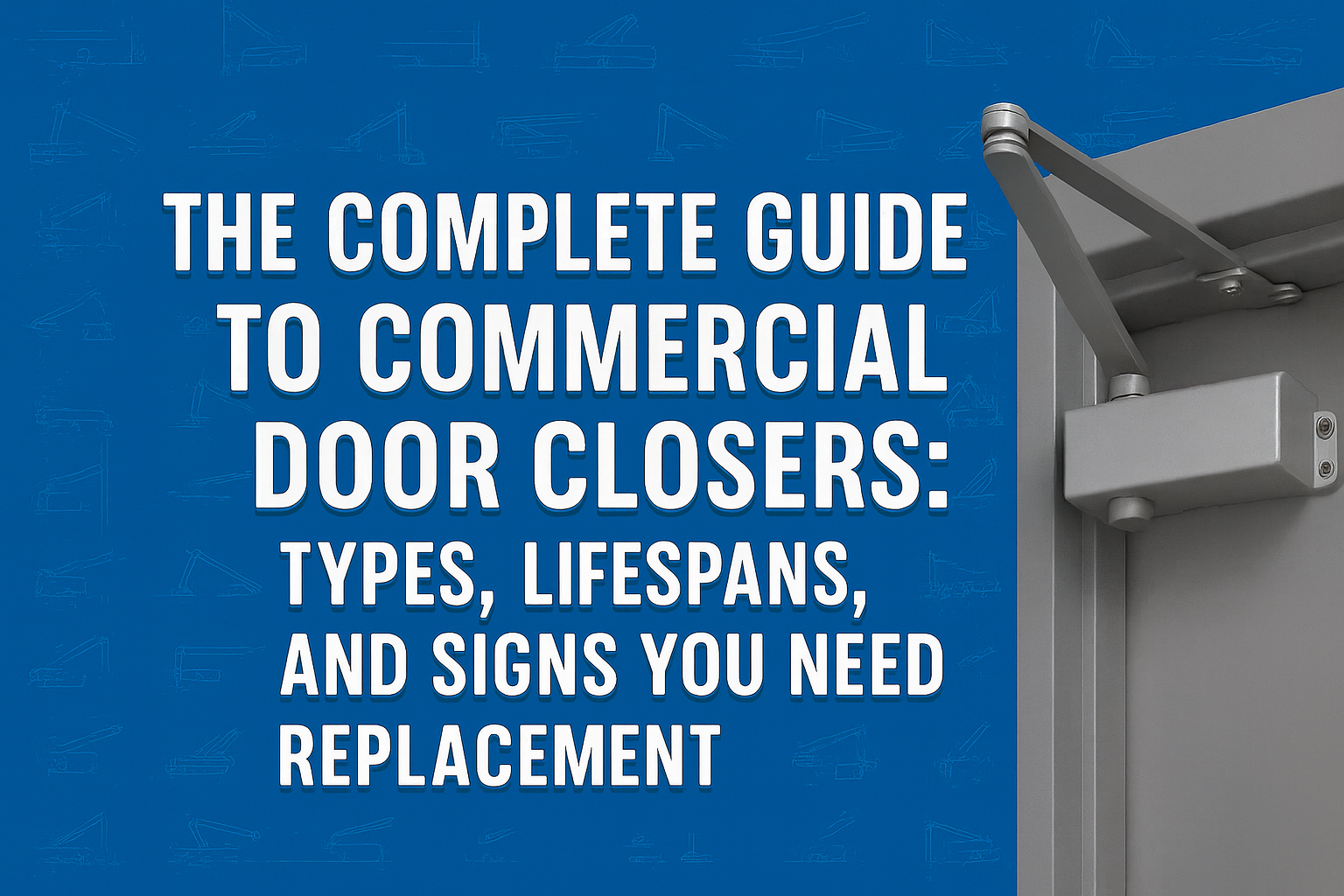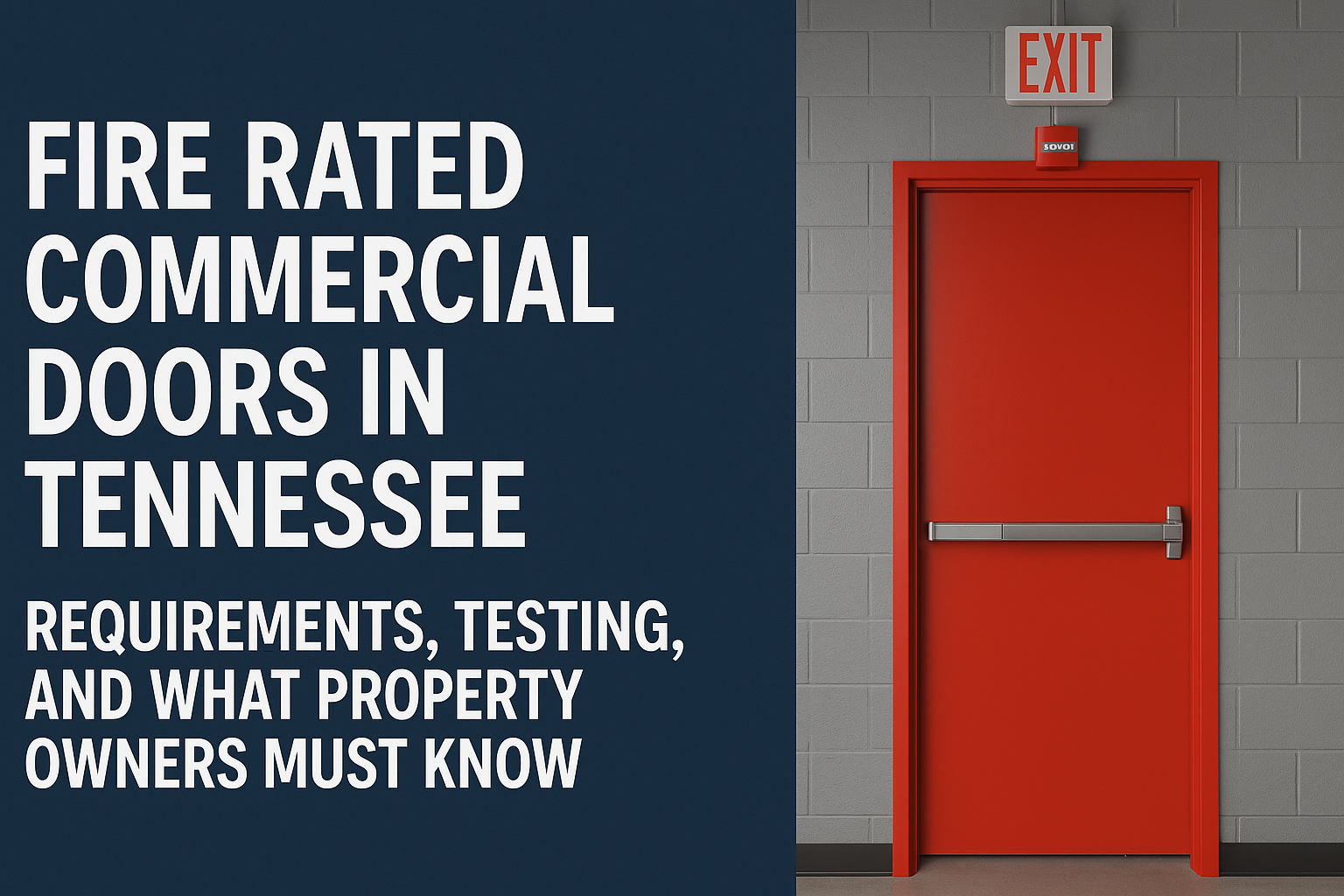Commercial Entry Doors: What Are Your Options?
Looking for the right commercial entry door? This guide from Nashville Door Closer explores all your options—from aluminum storefront doors to steel, glass, and fire-rated models—plus code requirements, hardware, and security upgrades.
Choosing the right commercial entry door is about more than just looks. It affects your building’s security, accessibility, energy efficiency, and code compliance. Whether you're opening a new business, upgrading your current space, or replacing damaged doors, knowing your options helps you make informed decisions.
In this guide, we’ll break down the most common types of commercial entry doors, their ideal use cases, benefits, drawbacks, hardware compatibility, and how Nashville Door Closer can help you select and install the right one for your building.
Aluminum Storefront Doors
Aluminum storefront doors are a top choice for modern commercial buildings. Their sleek frames and full glass panels create a clean, professional look while maximizing natural light and visibility into your business.
Best For: Retail shops, shopping centers, office lobbies, banks, and service businesses
Advantages:
- Lightweight but strong, allowing for larger door sizes
- Weather-resistant and corrosion-resistant
- Easily paired with push/pull handles, panic hardware, or automatic door operators
- Can accommodate insulated glazing for better energy efficiency
Considerations:
- Not ideal for high-security applications without reinforced glass
- Requires regular adjustment and hardware checks due to daily wear
Popular Configurations: Single door, double door, sidelight + transom combinations
Steel Entry Doors
Steel entry doors are the go-to solution for high-security applications. Built for strength and durability, these doors offer excellent protection against break-ins, harsh weather, and heavy use.
Best For: Back entrances, warehouses, schools, industrial buildings, utility rooms
Advantages:
- Extremely strong and impact-resistant
- Often available with UL fire ratings (up to 3 hours)
- Compatible with most commercial door hardware
- Lower cost compared to high-end glass or aluminum systems
Considerations:
- Heavier than aluminum or fiberglass options
- Limited design and finish options unless wrapped with veneer or specialty coatings
Security Upgrade: Integrate steel doors with electronic locks, keypads, or card access for secure entry without compromising strength.
Glass Entry Doors
Glass commercial entry doors are ideal for creating a high-end, open feel. From frameless styles to slim aluminum rail frames, these doors help businesses stand out visually.
Best For: Spas, salons, galleries, high-end retail, dental or wellness offices
Advantages:
- Modern and transparent aesthetic
- Supports branding and product visibility
- Available in tempered, laminated, or insulated safety glass
Hardware Compatibility:
- Patch fittings or rails can support door closers and panic hardware
- Compatible with magnetic locks or electric strikes when mounted properly
Considerations:
- More fragile and may require frequent cleaning
- Higher cost for specialty glass or custom finishes
Fire-Rated Commercial Entry Doors
Fire-rated doors are not just for interior corridors—they’re often required at commercial entries that lead into stairwells, fire barriers, or hazardous areas.
Best For: Entryways connecting to corridors, kitchens, mechanical rooms, or stair enclosures
Advantages:
- Required for code compliance in many commercial buildings
- Slows the spread of smoke and fire to protect occupants and property
- Ratings from 20 minutes to 3 hours
- Works with fire-rated closers, exit devices, and gaskets
Important Compliance Note: If your door is fire-rated, every component—including the frame, hinges, latch, and closer—must also carry a UL or WHI label to preserve the door’s rating.

Hollow Metal Doors
Hollow metal doors are constructed from steel sheets wrapped around a reinforced core. They strike a balance between security, durability, and affordability.
Best For: Schools, hospitals, government buildings, mixed-use facilities
Advantages:
- Built to withstand abuse, vandalism, and high usage
- Accepts a wide variety of locks, exit devices, vision lites, and louvers
- Available with core options: honeycomb, steel stiffened, polystyrene, polyurethane, or mineral core (for fire-rated doors)
Customization Options: Paint finish, stainless steel skins, glass inserts, louvers for airflow, ADA thresholds
Energy Efficiency Tip: Choose insulated cores and tight-fitting weatherstripping for exterior-facing doors to reduce energy costs.
Fiberglass Reinforced Plastic (FRP) Doors
FRP doors are an excellent choice for environments that demand impact resistance, hygiene, and minimal maintenance. These doors are often seen in schools, cleanrooms, or high-humidity environments.
Best For: Schools, labs, restrooms, pools, food prep areas
Advantages:
- Won’t rust, corrode, or delaminate
- Resistant to scratches, dents, and chemical cleaners
- Molded fiberglass skins and full perimeter seals
Code Note: FRP doors can also be ordered with fire ratings and reinforced hardware mounting areas.
Wood Veneer Entry Doors (With Commercial Cores)
When aesthetics are key but performance still matters, wood veneer doors with solid commercial cores offer the best of both worlds.
Best For: Law offices, religious institutions, executive suites, upscale interiors
Advantages:
- High-end appearance with commercial-grade strength
- Available with fire-rated mineral cores
- Custom veneers, stains, and species available
Considerations:
- May require more maintenance and are vulnerable to moisture if not sealed properly
Design Tip: Combine a wood veneer entry with sidelights and a secure glass transom to enhance curb appeal.
Custom Entry Door Systems
Not all commercial buildings fit the mold. That’s why custom entry systems allow businesses to meet exact architectural, accessibility, and branding goals.
Best For: Historic buildings, luxury storefronts, schools, medical facilities, religious spaces
Available Features:
- Custom sizes, colors, and hardware cutouts
- Decorative glass and panel configurations
- ADA push-button openers and threshold modifications
Need something outside the box? Nashville Door Closer can consult on specialty door packages and coordinate with your architect or GC.
Entry Door Hardware Options
The best commercial door is only as good as its hardware. Nashville Door Closer installs and services all major hardware components:
Hardware Types:
- Panic bars and exit devices (rim, vertical rod, mortise)
- Commercial door closers (surface, concealed, overhead)
- Electric strikes and magnetic locks
- Keyless entry systems (keypads, card readers, mobile access)
- Weatherstripping, thresholds, sweeps for exterior sealing
- Hinges, pivots, and continuous hinges for heavier doors
Integration Tip: Many door types can be upgraded with access control—especially aluminum and hollow metal doors.
Nashville Door Closer: Your Partner in Entry Door Solutions
No matter what your building requires—strength, fire protection, modern aesthetics, or custom finishes—our team helps you choose and install the right commercial entry door with confidence.
From the first consultation to final installation,
Nashville Door Closer delivers code-compliant, secure, and professionally installed door systems backed by years of experience.
Ready to upgrade your entry? Contact us today to request a quote or schedule a walkthrough at your facility.















